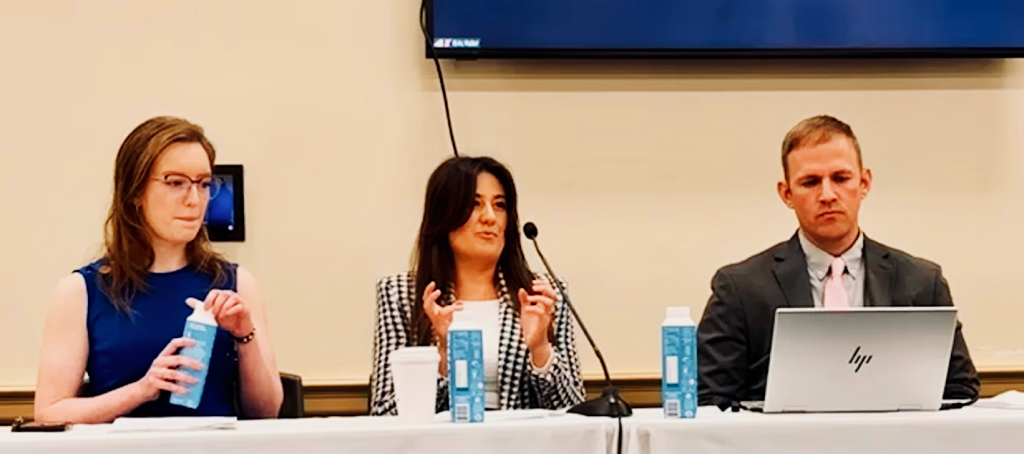(Action item at the end of the article.)
The “Shielding Children’s Retinas from Egregious Exposure on the Net” (SCREEN) Act would require pornographic adult websites to implement age verification technology to ensure children are protected from accessing harmful content. This bill should not be partisan. In fact, it should be one of the easiest bills to pass, even in our hyper-partisan age.
The hundreds of thousands of women represented by Concerned Women for America Legislative Action Committee (CWALAC) are eager to advocate for such noble legislation and work with Congress members to ensure its passage.
Amidst a busy week dealing with border issues and Israel funding, we were honored to attend the Congressional Family Caucus’ inaugural congressional staff briefing on the SCREEN Act. As CWALAC’s Legislative Strategist who has been tracking this bill and meeting with members of Congress for over a year, even bringing it to the attention of House members to ensure its introduction, it was an honor to be asked to speak on the panel briefing congressional staffers on this important issue.

CWALAC Legislative Strategist Valerie Bynog (center) speaks at the briefing on the SCREEN Act.
It is no secret that pornography has ravaged our modern times. It is an internal slow rot in our society that continues to grow. It is truly a pandemic that has caused 17 states to recognize pornography as a public health hazard. According to one study, six in ten Americans report having watched pornography at some point in their lives. Pornography or sexually explicit material is not new; it has existed since the start of humanity, but what has changed is the ease of access. Even just 30 years ago, if an individual was looking for sexually explicit material, they had to go to the local adult store, have a subscription to Playboy, or go to the adult content section of the local video rental store. So not only was there an intentional search for the content, but there was a shame in being caught. The local high school teacher did not want to risk the embarrassment they would feel if their students saw their explicit content purchase.
The invention of the internet and the smartphone, while beneficial in many ways, created the perfect storm for pornographic addictions. No longer did an individual have to intentionally seek out pornography or risk the shame of being caught, but addiction could now flourish with unfettered access. Pornhub alone generated 4.2 billion site visits in 2019, that is 4.8 million visits every hour. How does Pornhub create so much traffic for their websites? Well, humans are flawed and often driven by perverse motives, sure, but the more sinister business model is creating addicts at a young age to ensure they have customers for years to come.
A study that utilized young children ranging from 11 to 16 from Middlesex University in London showed that 28% of respondents were first exposed to pornography by accident, and 19% were unexpectedly shown it by someone else. An adolescent brain is not the same as an adult brain; it is undeveloped, specifically the prefrontal cortex. This region of the brain is known to control your behavior and impulses, delay instant gratification, regulate your emotions, balance short-term rewards with future goals, and predict the consequences of your behavior. However, similar to an adult’s brain, when a child looks at pornography, their body is still flooded with dopamine, creating an extremely pleasurable experience. The difference between the developed and undeveloped brain is that a child’s brain is literally unable to understand why viewing pornography is harmful and has long-term negative effects, like loneliness and depression. Due to their inability to properly process explicit content, they are creating unhealthy neural pathways and setting themselves up to be lifelong addicts.
Recently, Utah passed an age-verification bill in their state legislature – a great victory! Upon finding out the news, Pornhub pulled their platform from the access of Utah citizens (yet another victory!) They thought that by pulling their platform, legislators and citizens would riot and call for the removal of the new law. Thankfully, Utah said, “Good riddance!” The age verification law should have never merited that kind of response. Who could actively advocate for the necessity of children’s viewership of pornography? Not that many would argue in defense of Pornhub’s moral compass, but its action in Utah only magnified its lack of care for all, but especially our children. It is almost like they actually want to target this material to children. Well, they are going to have to deal with the women of CWALAC standing against them every step of the way.
There is much to be done about the moral rot that is pornography in our culture, but an easy first step is to pass the SCREEN Act, ensuring that age verification is required of every adult content website, specifically alleviating the unintentional exposure that children are often presented through online ads and links. Children are physically incapable of making rational decisions when it comes to pornography. It is clear that if we wait for adult content websites to take this issue seriously, nothing will ever be done.
TAKE ACTION >>> Please visit CWALAC’s Action Alert page here to urge your members of Congress to support the SCREEN Act.


